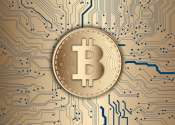Microsoft announces Coco Framework to facilitate businesses looking to adopt blockchain tech
(Tech Xplore)—Business watchers are looking to blockchain technology as transformational but easier said than done.
Business

(Tech Xplore)—Business watchers are looking to blockchain technology as transformational but easier said than done.
Energy & Green Tech

Extracting a dollar's worth of cryptocurrency such as bitcoin from the deep Web consumes three times more energy than digging up a dollar's worth of gold, researchers said Monday.
Nov 5, 2018
1
1273
Energy & Green Tech

Bitcoin has landed front and center in the ongoing debate over benefits of cryptocurrencies and impact on the environment.
Business

Financial payments startup Square was at work Friday on a real-world wallet for safely pocketing bitcoin cryptocurrency.
Jul 10, 2021
1
204
Business

For a minute there, it looked like Ronny Maali had struck it rich—relatively speaking.
Feb 4, 2021
2
81
Computer Sciences

In collaboration with a team at the Federal Reserve Bank of Boston, MIT experts have begun designing and testing technical research through which further examination of a Central Bank Digital Currency (CBDC) can be performed ...
Feb 4, 2022
2
252
Business

Sierra Leone is to delay the phaseout of its old currency until next spring, the central bank said.
Sep 16, 2022
0
26
Energy & Green Tech

When it comes to predicting the costs of new energy systems and technologies, researchers must consider learning rates, which are estimated measures of technological progress. In fact, technological advances are typically ...
Internet

Facebook unveiled plans Tuesday for a new global cryptocurrency called Libra, pledging to deliver a stable virtual money that lives on smartphones and could bring over a billion "unbanked" people into the financial system.
Jun 18, 2019
1
128
Business

Jack Dorsey on Friday put out word that his financial payments startup Square is thinking about making a real-world wallet for safely pocketing bitcoin.
Jun 4, 2021
4
9
In economics, currency refers to a generally accepted medium of exchange. These are usually the coins and banknotes of a particular government, which comprise the physical aspects of a nation's money supply. The other part of a nation's money supply consists of bank deposits (sometimes called deposit money), ownership of which can be transferred by means of cheques, debit cards, or other forms of money transfer. Deposit money and currency are money in the sense that both are acceptable as a means of payment.
Money in the form of currency has predominated in human civilizations from about 10,000 BCE on. Usually (gold or silver) coins of intrinsic value (commodity money) have been the norm. However, nearly all contemporary money systems are based on fiat money – modern currency has value only by government order (fiat). Usually, the government declares the fiat currency (typically notes and coins issued by the central bank) to be legal tender, making it unlawful to not accept the fiat currency as a means of repayment for all debts, public and private.
This text uses material from Wikipedia, licensed under CC BY-SA